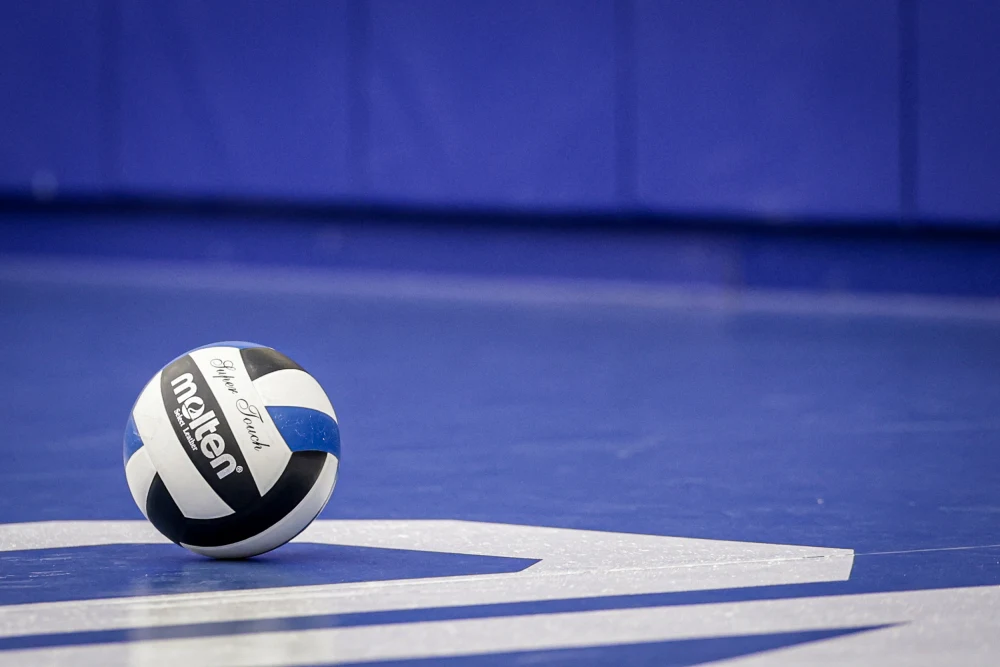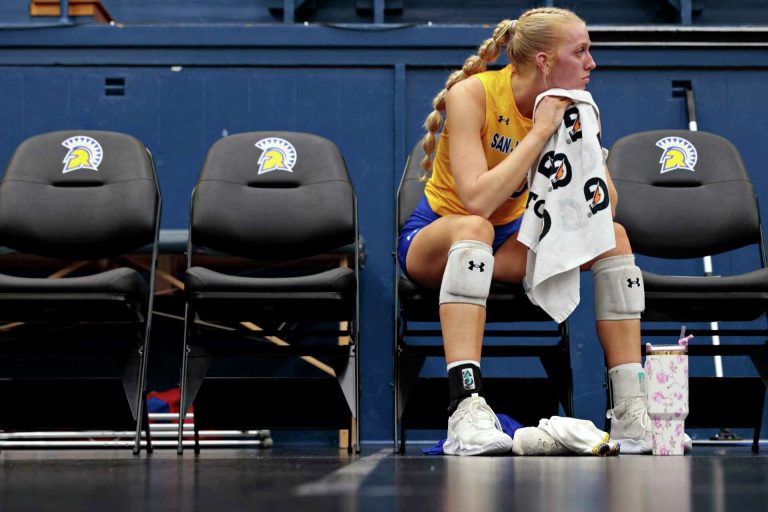Lawsuit Filed Against Mountain West Conference and SJSU Over Transgender Athlete Controversy
In the latest development of the ongoing controversy involving a transgender player on the San Jose State University (SJSU) women’s volleyball team, a lawsuit has been filed against the Mountain West Conference, the California State University system, and three SJSU staff members, including the head coach of the women’s volleyball team.
Plaintiffs Claim Title IX Violations
The plaintiffs, which include SJSU volleyball co-captain Brooke Slusser and 10 other current and former student-athletes from the Mountain West Conference, claim that their Title IX rights are being violated by allowing a transgender athlete to compete on a women’s sports team. Title IX mandates equal opportunities for men and women in education and athletics, and the plaintiffs argue that the inclusion of a transgender player in women’s sports undermines this protection for female athletes.
The lawsuit, which spans 132 pages, seeks a court-ordered injunction to prevent the transgender athlete from competing in the upcoming conference tournament. The plaintiffs assert that the participation of the transgender athlete is unfair and violates their rights.
Brooke Slusser Expresses Frustration
Brooke Slusser voiced her frustration over the situation. “It’s amazing that one person on our team is causing all of these issues,” she told Fox News earlier this week. Slusser, along with the other plaintiffs, is seeking legal action to ensure that fairness and equal opportunities are maintained for female athletes in the Mountain West Conference.
Marshi Smith Speaks Out
Marshi Smith, a former NCAA champion swimmer and co-founder of the Independent Council on Women’s Sports (ICONS), is supporting the lawsuit. ICONS is financially backing the plaintiffs in their legal efforts. Smith emphasized the importance of providing female athletes with a fair chance to compete, noting that the current situation has become a point of significant concern for many in the sports community.
“It’s disappointing it’s come to this point,” Smith said, describing the situation as a “failure at every level of leadership.” She criticized the handling of the issue by athletic organizations and expressed disappointment over the lack of action to address concerns about fairness in women’s sports.
Mountain West Conference Responds
The Mountain West Conference has acknowledged the lawsuit and stated that it takes the allegations seriously. In a statement to NBC Bay Area, the conference emphasized its commitment to prioritizing the welfare of student-athletes. “The Mountain West Conference prioritizes the best interests of our student-athletes and takes great care to adhere to NCAA and MW policies,” the statement said. The conference refrained from commenting on the specifics of the ongoing litigation but affirmed its dedication to upholding fairness in athletic competition.
San Jose State University Responds
San Jose State University has confirmed receipt of the lawsuit and stated that it is in the process of reviewing the complaint. “We received the complaint and will review and respond appropriately,” an SJSU spokesperson told NBC Bay Area. The university has declined to make any further comments at this stage, as the case remains pending.
Associate Head Coach Melissa Batie-Smoose’s Absence
The lawsuit follows reports that SJSU’s women’s volleyball associate head coach, Melissa Batie-Smoose, has been absent from the team for undisclosed reasons. Batie-Smoose, who is among the plaintiffs in the lawsuit, joined the Spartans’ coaching staff last year, bringing over 20 years of coaching experience. Prior to her tenure at SJSU, Batie-Smoose coached at Fairfield University and started her Division 1 coaching career at the College of the Holy Cross and Cornell University.
SJSU confirmed her absence but did not provide details regarding the reason for her departure. Batie-Smoose addressed her situation publicly on social media, stating, “I was removed from my SJSU volleyball team for standing up for my players’ rights, but I’ve gained a new team of courageous women fighting the mistreatment facing all players in the Mountain West Conference.”
Plaintiffs Seek Additional Legal Remedies
In addition to seeking an injunction to prevent the transgender athlete from competing in the upcoming Mountain West Conference volleyball tournament, the plaintiffs are requesting that the forfeited games against SJSU by other teams be removed from the records. According to Marshi Smith, the forfeitures by several teams have already occurred, including the University of Nevada, Reno; the University of Wyoming; Boise State University; and Utah State University. Southern Utah University, a non-Mountain West member, also forfeited a match against SJSU.
The plaintiffs argue that these forfeitures were directly related to the presence of the transgender athlete on the team, and they seek to have these forfeits expunged from team records.
The NCAA’s Role in the Controversy
The controversy has escalated further after a federal lawsuit was filed against the NCAA, specifically challenging a policy that allows transgender athletes to compete on women’s teams under certain conditions. One of the plaintiffs in the case is a member of the SJSU women’s volleyball team, who claims that having a transgender teammate is unsafe for her, her teammates, and opposing teams.
The lawsuit has sparked wider debates about transgender participation in sports and raised concerns about the impact of NCAA policies on fairness in women’s competitions. In response to the growing controversy, SJSU has increased security for its volleyball team at both home and away matches.

Mountain West Commissioner Comments on Forfeitures
Before the University of Nevada, Reno’s forfeiture, Mountain West Conference Commissioner Gloria Nevarez, one of the defendants in the lawsuit, publicly criticized the decision of teams to avoid playing against SJSU. Nevarez expressed disappointment, stating that such actions do not align with the values of college athletics.
She told The Associated Press, “It breaks my heart because they’re human beings, young people, student-athletes on both sides of this issue that are getting a lot of national negative attention. It just doesn’t feel right to me.” Nevarez emphasized that the controversy has affected the reputations of the athletes involved, drawing national attention to an issue she believes should be handled differently.
Political Support for Forfeitures
Governors from Nevada, Idaho, Utah, and Wyoming have expressed support for the teams’ decisions to cancel games against SJSU, citing concerns about fairness in women’s sports. These political figures have voiced their belief that allowing transgender athletes to compete in women’s sports undermines the integrity of female competitions.
San Jose State University has not commented on the statements made by the governors regarding “fairness” in women’s sports. The university has instead focused on the legal process, emphasizing that it is reviewing the lawsuit and will respond accordingly.
The National Debate Over Transgender Athletes in Sports
The case has become a focal point in the larger national debate over transgender athletes’ participation in sports. Advocates for transgender inclusion argue that all athletes, regardless of gender identity, should have the right to compete in the category that aligns with their gender identity. Meanwhile, critics of transgender inclusion in women’s sports assert that allowing transgender women to compete gives them a physical advantage, making the competition unfair for cisgender women.
The outcome of this lawsuit could set a significant legal precedent, not only for the Mountain West Conference but also for other collegiate athletic organizations grappling with similar issues. Legal experts predict that the case will likely have a broad impact on the interpretation of Title IX and the treatment of transgender athletes in college sports.
As the case unfolds, the tension surrounding transgender athletes in women’s sports is expected to intensify, with more legal, public, and political scrutiny likely to follow. The resolution of this case will undoubtedly have far-reaching implications for the future of gender inclusion in sports at all levels.

